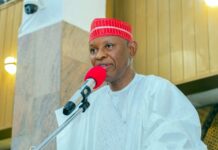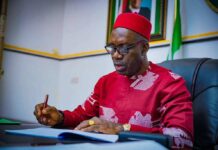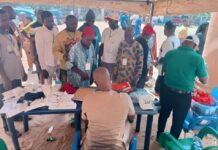Vice-President Kashim Shettima says President Bola Tinubu’s administration is working hard to tame bottlenecks to universal education in Nigeria.
According to him, this is being championed through the ongoing reforms of the institutions tasked with overcoming the ideologies and inadequacies frustrating the sub-sector.
Mr Shettima stated this on Thursday at the launch of a book titled ‘Navigating the Politics of Universal Education Policies in Nigeria’, authored by Deputy Governor Modupe Adelabu of Ekiti.
“As a steward of the nation, His Excellency, President Bola Tinubu is leading the charge to reform the institutions tasked with overcoming the ideologies and inadequacies that had frustrated universal education in Nigeria,” the vice-president stated.
Mr Shettima said the lack of financial autonomy for the local governments that were responsible for delivering primary education had financially hindered its alignment of the administrative units with the nation’s education agenda.
Mr Shettima, however, said the recent Supreme Court judgment empowering the local government councils to control their resources brought them closer to the people.
The vice-president warned that the local government autonomy should not be abused, stressing that it should be used as a fulcrum, window and avenue for addressing educational needs at the grassroots level.
Mr Shettima urged governments at all levels to focus on policies that empower those at the forefront of implementing initiatives that inspire interest in education.
He said, “Tinubu’s decision to establish the Student Loan Scheme in the country was to secure the future of Nigerian children. The initiative ensures that every student has access to loans to pay their tuition, and the Nigeria Education Loan Fund (NELFUND) has already recorded an overwhelming number of applications.
“This is a landmark achievement, signalling the bright future we are building for our youth. Beyond making education universally free, our experience shows that incentivising is the most practical gateway before us. This is why all of us, across all levels and branches of government, must join this campaign to educate the nation.”
The vice-president added, “Many primary and secondary school-age children are still not attending or completing their education, and a large portion of the youth population lacks basic literacy skills, with notable gender disparities. This is what we must overcome.”
Shettima commended Ms Adelabu for providing answers to some of the most pressing challenges confronting policymakers.
According to him, the book will undoubtedly inspire informed conversations around the state and future of education in Nigeria.
(NAN)





